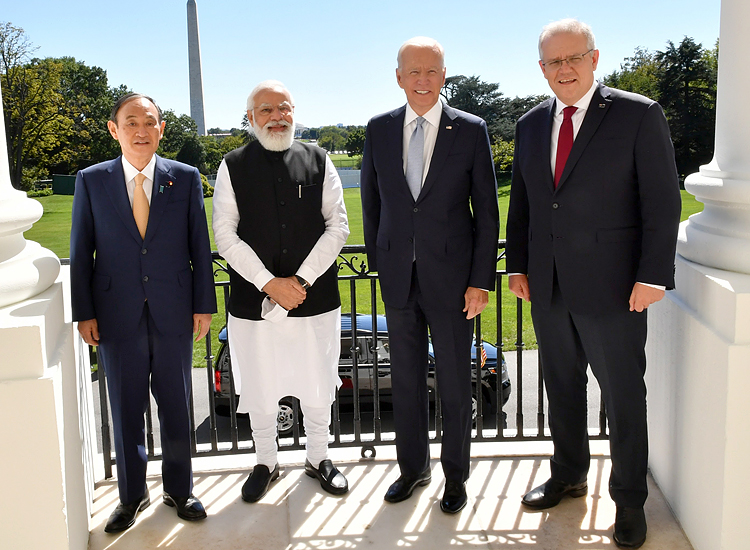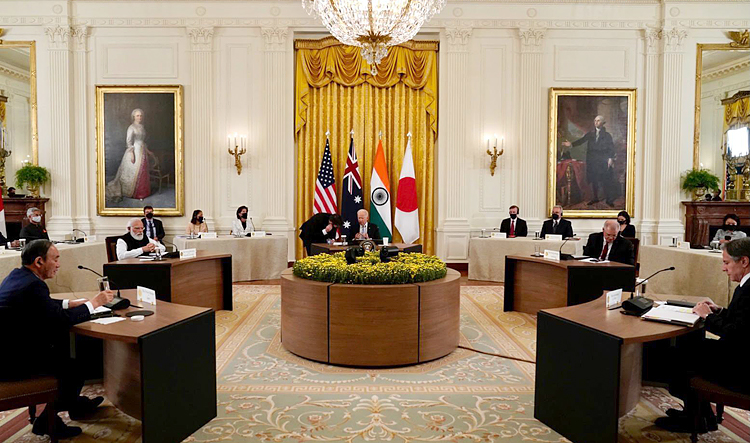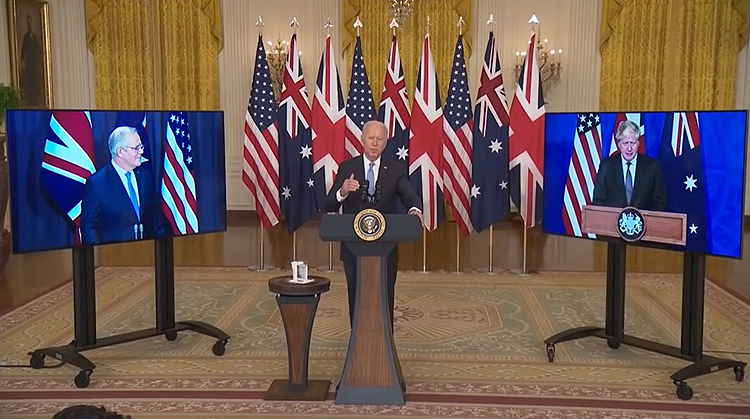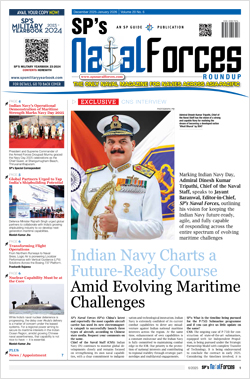INDIAN ARMED FORCES CHIEFS ON OUR RELENTLESS AND FOCUSED PUBLISHING EFFORTS

The insightful articles, inspiring narrations and analytical perspectives presented by the Editorial Team, establish an alluring connect with the reader. My compliments and best wishes to SP Guide Publications.

"Over the past 60 years, the growth of SP Guide Publications has mirrored the rising stature of Indian Navy. Its well-researched and informative magazines on Defence and Aerospace sector have served to shape an educated opinion of our military personnel, policy makers and the public alike. I wish SP's Publication team continued success, fair winds and following seas in all future endeavour!"

Since, its inception in 1964, SP Guide Publications has consistently demonstrated commitment to high-quality journalism in the aerospace and defence sectors, earning a well-deserved reputation as Asia's largest media house in this domain. I wish SP Guide Publications continued success in its pursuit of excellence.
- Global Partners Urged to Tap India's Shipbuilding Potential: Rajnath Singh at Samudra Utkarsh
- All about HAMMER Smart Precision Guided Weapon in India — “BEL-Safran Collaboration”
- India, Germany deepen defence ties as High Defence Committee charts ambitious plan
- G20 Summit: A Sign of Global Fracture
- True strategic autonomy will come only when our code is as indigenous as our hardware: Rajnath Singh
- India–Israel Joint Working Group Meeting on defence cooperation to boost technology sharing and co-development
QUAD Leaders Summit and AUKUS
QUAD can actually be as powerful as AUKUS or even more, in case the capabilities of all members is built up suitably, under the pledge of sharing critical and futuristic technologies
 |
The Author is Former Director General of Information Systems and A Special Forces Veteran, Indian Army |

On September 24, 2021, QUAD leaders converged on the White House for the first ever in-person QUAD Leaders Summit; leaders of the four nations being US President Joe Biden, Indian Prime Minister Narendra Modi, Japanese Prime Minister Yoshihide Suga and Australian Prime Minister Scott Morrison. Earlier on March 12 this year, the first virtual summit of the QUAD leaders was held culminating in the joint statement ‘The Spirit of the QUAD’ which among multiple issues committed to: free and open Indo-Pacific; centrality of ASEAN; share challenges of the pandemic, climate-change, cyber-space, critical technologies, counter-terrorism, infrastructure investment, humanitarian-assistance, disaster-relief and maritime domains, and; cooperation in futuristic critical technologies.
India’s strategic location in the Indian Ocean is of great significance to the QUAD especially with the other three members (Australia, Japan and America) on the Pacific Ocean side
Highlights of the summit on September 24 included concurrence on: Free and Open Indo-Pacific - conforming to ASEAN’s outlook and centrality, willingness to work together and with a range of partners in the region and welcoming EU Strategy for Cooperation in the Indo-Pacific; Combating COVID-19 - India to make one billion doses of COVID-19 US vaccines by end 2022, Australia and Japan to continue assisting QUAD initiatives for combating COVID-19 and joint pandemic-preparedness tabletop/exercise to be conducted in 2022; Science and Technology - develop competitive technology ecosystems, reduce barriers to data and knowledge sharing for research projects and greater innovation, monitor future trends in advance technologies to address shared objectives including in critical and emerging technologies, 5G and beyond-5G networks, scalability and cyber-security, supply chain of semi-conductors, collaboration in space and share satellite data; Climate and Disaster Response - keep Paris-aligned temperature limits to 1.5°C above pre-industrial levels, pursue clean-energy innovation and climate adaptation aiming for net-zero emissions by 2050, strengthen disaster resilient infrastructure and climate information systems, green shipping network, establish 2-3 low/zero emission shipping corridors by 2030 and establish partnership for ‘clean-hydrogen’ and climate & information services; Infrastructure - build on G7’s ‘Build Back Better World’ (B3W) initiative, QUAD Infrastructure Coordination Group to share assessments of regional infrastructure requirements, coordinate technical assistance and capacity-building efforts to mutually reinforce in meeting the significant infrastructure demand in the Indo-Pacific; Afghanistan – called upon Taliban to respect human rights and ensure Afghanistan’s territory is not used by terror organisations; North Korea and Myanmar - urged North Korea to refrain from provocations and Myanmar to restore democracy.
On September 15, the US, the UK and Australia announced a trilateral security pact ‘AUKUS’ under which Australia will be provisioned with six nuclear-powered submarines; SSN technology which the US earlier only gave to the UK in 1958. This sudden announcement apparently was to salvage some of its reputation the US lost from its recent strategic blunder in Afghanistan.
QUAD Summit– Implications for India
India is the only QUAD nation that shares a 3,488 km land border with hostile China and as such is most affected. India’s strategic location in the Indian Ocean is of great significance to the QUAD especially with the other three members (Australia, Japan and America) on the Pacific Ocean side. The US wants India to counter balance China in the region but India will have to continue confronting a hostile China on its own, with the US only interested in defence exports and cooperation on the waters of Indo-Pacific. This is more than evident with Joe Biden’s recent conciliatory speech towards China at UNGA.

India producing one billion COVID-19 American vaccines by end 2022 will imply investments coming in. It will also boost PM Modi’s claim of India being a pharmacy for the world. As for the rest of payoffs including sharing of critical technologies, this will depend on what the US is ready to share and at what price? Witness the technical bonanza US has gifted to Beijing by abandoning $92 billion worth weapon platforms in Afghanistan including aircraft and helicopters which will be reverse engineered by China. India can, however, leverage the QUAD cooperation to bridge its gap in semi-conductors particularly with Japan, also using its relations with Taiwan.
The US is least bothered about the China-Pakistan-Taliban-Turkey radical nexus as long as mainland America is not attacked
The US has been using proxy forces for decades and is responsible for the birth of terrorist organisations like the Taliban and ISIS. Deliberate handing over of Afghanistan to the Taliban having 14 UN-designated terrorists in its government has exposed the US completely. It can no longer sermonise on human rights and terrorism. It still seeks cooperation from Taliban in fighting Al Qaeda. To top this, the US refuses to act against Pakistan which is the very source of terrorism in South Asia. India should only expect selective intelligence inputs in battling terror other than perfunctory statements from the US. The US is least bothered about the China-Pakistan-Taliban-Turkey radical nexus as long as mainland America is not attacked.
AUKUS and QUAD
AUKUS gives free-hand to China for proliferating SSN technology to Pakistan and Iran. The US State Department making categorical statement that India and Japan will not be added to AUKUS was in bad taste and raises questions whether America has an underhand understanding with China on the issue. To mention this specifically was a snub to India given that Japan has a defence pact with the US and vessels from US and UK visiting Japan at times are known to be nuclear armed, not nuclear propelled alone.

AUKUS has created a US-EU divide to China’s advantage especially with China being EU’s largest trading partner. Significantly on September 16, 2021, China applied to join the Comprehensive & Progressive Agreement for Trans-Pacific Partnership (CPTPP), an economic agreement of 11 countries including Australia and Japan. China will use its economic clout through the CPTPP to influence economies of Australia and Japan.
On September 21, 2021, Foreign Secretary Harsh Shringla told media that AUKUS has no link with QUAD and will have no impact on the functioning of the latter. There have been views that QUAD is the benign face of AUKUS with others saying that both are two sides of the same coin. QUAD can actually be as powerful as AUKUS or even more, in case the capabilities of all members is built up suitably under the pledge of sharing critical and futuristic technologies without a security pact while maintaining that the grouping is not targeting any country. But, neither Joe Biden nor his administration appears inclined towards this.
The US State Department making categorical statement that India and Japan will not be added to AUKUS was in bad taste and raises questions whether America has an underhand understanding with China on the issue
China’s reaction to AUKUS came from its Zhao Lijian, foreign ministry spokesperson decrying “exclusive ‘cliques’ targeting other countries” and saying the group was “doomed to fail.” China had earlier pooh-poohed QUAD also. But China is far from being alarmed given President Biden’s propensity to ignore military advice (as has happened in Afghanistan), inconsistencies in decision making, failure to firmly deal with Pakistan and conciliatory approach towards China.
The QUAD needs to be expanded speedily to bring more pressure on China but nothing has really happened in that direction perhaps because of America’s nonchalance. For India in a protracted hostile border with China and ongoing sub-conventional war with China-Pakistan, in addition to possibility of conflict, QUAD and AUKUS will remain of peripheral consequence.





